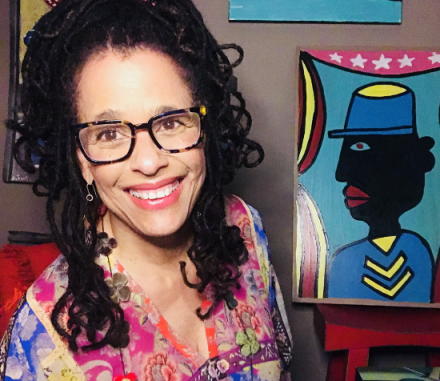The virtual event was part of a series of activities planned for Earth Week 2021.
Author and cultural geographer Carolyn Finney delivered a keynote address to the Elon community on April 22 as part of Earth Week events.
Titled “Seeing Green: Christian Cooper, John Muir and Playing the Long Game,” her address drew from her book “Black Faces, White Spaces” and explored the intersection of race, racism and the environment.
 “In institutions, especially academic ones, having conversations about the environment can be challenging,” said Finney. “I’m so grateful to be able to engage with students and faculty and have these conversations.”
“In institutions, especially academic ones, having conversations about the environment can be challenging,” said Finney. “I’m so grateful to be able to engage with students and faculty and have these conversations.”
Kaitlynn Dixon ’21, an intern for the Office of Sustainability, introduced Finney. Dixon is also the student coordinator for the Eco-Reps Program. “Our goal is to foster sustainability through peer education,” said Dixon. “We do that through creating sustainable and intersectional programs.”
Finney works as a cultural geographer to develop greater cultural awareness within environmental organizations and institutions. Before becoming a cultural geographer, Finney served as a member of the United States National Parks Advisory Board for eight years.
As part of her profession, Finney connects human impact stories to the environment.
To begin her presentation, Finney addressed the verdict in the trial of Minneapolis police officer Derek Chauvin, who was recently convicted in the death of George Floyd last summer. She believes that the country does not fully understand the ramifications of the verdict. Finney’s career has allowed her to study the racial history associated with a variety of environmental conflicts.
Throughout her childhood, Finney grew to love spending time in the outdoors. Her parents were employed as gardeners, and she credits her interest in nature to growing up surrounded by it. Her parents tended an estate for 50 years before a conservation easement was placed on the land. Finney was not able to return to her childhood home, and the easement sparked Finney’s interest in the history of public lands.
“When we say public lands, what public are we talking about?” she asked.
Finney’s interest in public lands led her to explore the national parks. After backpacking throughout the world for five years, Finney began to understand the controversy behind the parks, as much of the designated land once belonged to Native American tribes. She believes that beginning the conversation is an important starting point in moving toward a recognition of the brutal treatment endured by the people and the lands.
As Finney concluded her presentation, she acknowledged the importance of Earth Day through paintings. Although the climate and lands are often associated with conflict and controversy, Finney emphasized the beauty of the planet, and her appreciation for the land that she was raised on.
“This painter [Robert Duncanson] is playing the long game,” she explained. “Despite all of the bad, he still believes in hope, and beauty, and I feel a responsibility for us to do better.”
Following the conclusion of Finney’s remarks, participants had the opportunity to ask her questions. The question-and-answer session was facilitated by Kelley Harer, the assistant director of sustainability for education and outreach.
The event was sponsored by the Office of Sustainability; African & African-American Studies; Campus Recreation & Wellness; Center for Environmental Studies; Center for Race, Ethnicity, & Diversity Education; and Public Health Studies.


